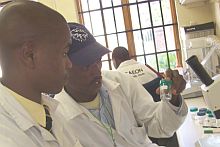SAEON supports National Science Week to highlight the role of science in economic development
|
- Rheyhana Mohamed, Science Communication Intern, South African Institute for Aquatic Biodiversity
This year National Science Week (NSW) ran from 2 – 6 August and took place at 88 sites across the country. The Makana district was one such site that endeavored to show learners the role of science in economic development — the theme for NSW 2010.
NSW is an annual celebration of science in which all nine provinces in the country participate. This year the Makana National Science Week Alliance was set up to organise and run NSW 2010 events. The Makana NSW Alliance committee consists of a collaboration between the Grahamstown District Department of Education (DoE), the Elwandle Node of the South African Environmental Observation Network (SAEON), Scifest Africa and a project of the South African Institute for Aquatic Biodiversity (SAIAB).
The objective of NSW is to contribute to Science, Engineering and Technology (SET) among various sections of the population and expose the public, educators and learners to science-based careers with a particular focus on disadvantaged sections of the population. With this in mind, the Makana NSW Alliance planned a number of events that would spur learners, parents, educators and the wider public’s interest in science. NSW has many pertinent objectives and the Alliance chose to focus on one of the key objectives — attracting learners to careers in SET.
Science clubs
The Makana NSW saw the successful launch of science clubs at four local high schools: Nathaniel Nyaluza, Sameul Ntsika, Mary Water’s and Nombulelo secondary schools. A science club was also launched at Hendrik Kanise Combined School in Alicedale. These schools were chosen because each had a SAIAB Bright Spark or two sitting in their classrooms. The Bright Sparks Development Programme is a project of SAIAB that rewards Grade 10 learners for receiving good marks in their science subjects.
The launch of the science clubs involved a full programme for each school. The Makana NSW Alliance visited each school to launch the club and hand over their science kit, which included a model torso, water testing kit, textbooks and posters.
“The contents of the science kit are intended to be used,” said SAIAB Stakeholder and Communications Manager, Penny Haworth addressing the learners, “they are not there to be locked up in a room. So you must decide how often you want to meet to do experiments and use the equipment.” The Director of Scifest Africa, Vera Adams assured learners and teachers that the Makana NSW Alliance will support all the schools in setting up their science clubs.
Grade 11 Bright Spark learner, Thandolwethu Bojo of Nathaniel Nyaluza Secondary School said that he was overwhelmed that his school now had science equipment. “This will enable me to mentor other learners via the club,” he explained.
Ntsika Secondary School Science educator, Solomon Johnson said how excited he was to see his learners use the dissecting kit, adding that the kit would make science more practical for the learners. “The kit will help us get the best out of our learners. Now I can show them that this is the brain and this is how the medulla operates,” said Elaine Gadu, Science Educator at Hendrik Kanise Combined School.
Jess Goble, a PhD student in Biochemistry at Rhodes University, awed learners and educators with her interactive and educational science show. The show illustrated to learners how they could do experiments without a laboratory and with items that are found in every household, such as bicarbonate of soda and dishwashing liquid.
The Makana NSW Alliance also provided after-school edutainment for learners in the form of a play entitled Through his eyes, performed by a local theatre company, Beneath the Skin Productions. In the play three young men took on the role of a number of characters that sought to deconstruct Charles Darwin’s Theory of Evolution. Learners became thoroughly engrossed in watching the three characters demonstrate the evolution of humankind.
Take-a-learner-to-work day
In keeping with the NSW theme The role of science in economic development, the Makana NSW Alliance afforded learners the opportunity to see first-hand how science contributes to a country’s economy. The take-a-learner-to-work-day initiative was well-supported by Grahamstown businesses. Organisations that took learners in for a day included SAIAB, SAEON, Grahamstown Pharmacy, Eskom and Rhodes University's Department of Physics.
On Wednesday, August 4, learners and employers met at the DoE district office for refreshments and to get paired up for a day of work. The aim of this initiative was to expose learners to careers in SET and also to motivate them in their studies to increase pass rates. At the end of the work day, learners reported that they had found the day informative and inspiring.
The World Café
To mark the end of NSW 2010, the Makana NSW Alliance hosted a one-of-its-kind Science World Café on Friday, August 6. The World Café is a structured and facilitated discussion which aims to encourage conversation, debate ideas and brainstorm solutions pertaining to a particular issue. Conversations are timed and once the time is up, participants move on to form new groups and build on the conversation from their last group. The conversations link to, and build on each other as people move between groups, cross-pollinate ideas, and discover new insights into the issues at hand.
Since 2010 is the International Year of Biodiversity (IYB), the themes for IYB and NSW were combined. The World Café explored the potential economic benefits drawn from conserving our biodiversity as well as the ways in which our individual actions impact on biodiversity conservation. SAIAB Managing Director, Prof Paul Skelton opened the event with a lecture entitled “B for Biodiversity - to B or not to B”. Setting the scene for the World Café, Skelton explored issues around the importance of conserving our biodiversity.















